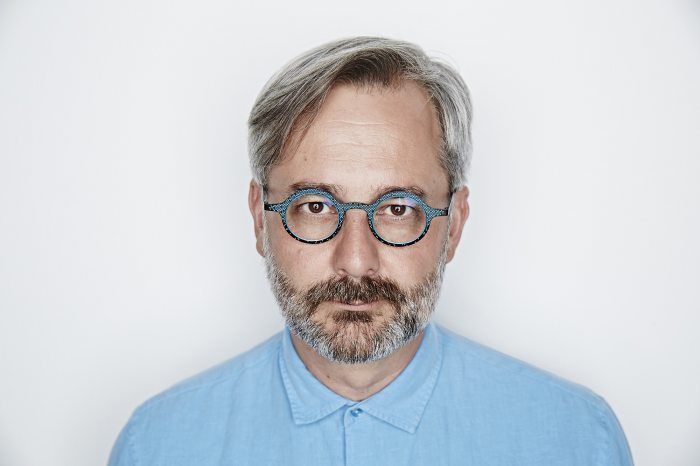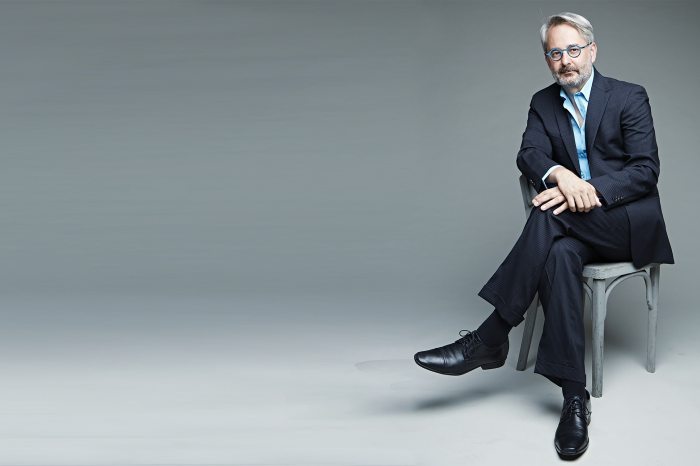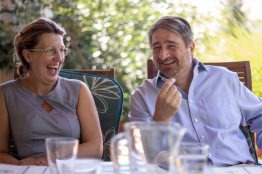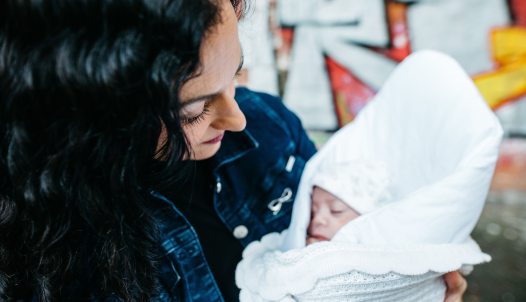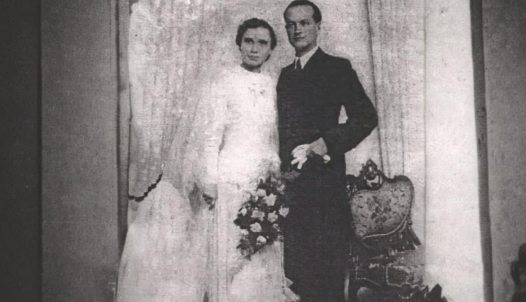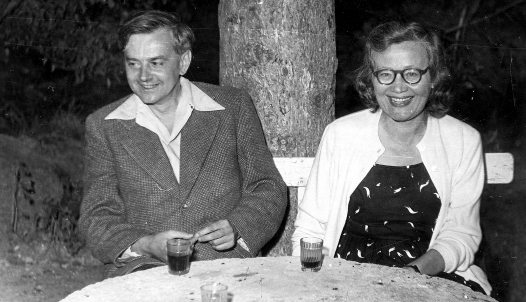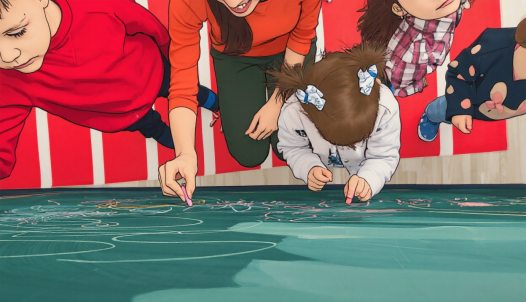Albert-László Barabási: "The responsibility of the scientist is to communicate clearly"
I had a conversation with the world-renowned Hungarian network researcher. For once, I do not want to extend the following text with a lengthy introduction, as I do not think my interviewee would be in favour of it. Join us for an afternoon chat with Albert-László Barabási.
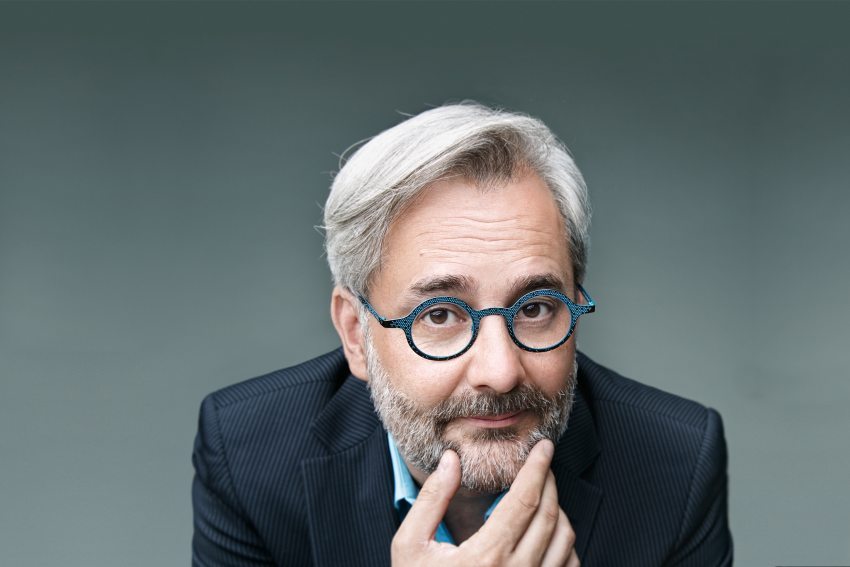
– When we were looking for an appointment, I had a glance into a very strict schedule for a moment. What I liked best was "I usually meet people after two". This strict schedule is obviously important for efficient work. Is it also good for your private life?
-I try to organise most of my work so that the structure gives me the direction I need. Health, for example, depends a lot on what you eat and how much exercise you do. I like walking, so we don't have a car and I've arranged my life so that I walk everywhere, it's my sport, I don't go to the gym. I live an hour from work in Boston, I walk to work every day. We don't think it's right to drive everywhere, so we don't have a car. We use a bicycle, or we get a taxi or a community car if we really have to, this is how we went on holiday, too. Or we feel that television is harmful, so we don't have a television.
The best motivation is to create a framework where things that we think are not healthy do not fit in.
– While walking to work are you just looking at the world or are you thinking about current projects?
- I'm on the phone. I usually call my mother in Transylvania, my friends and sometimes I have professional meetings.
- Do you talk to your mother about your research?
- Sometimes she sees it on Facebook and asks me if she got it right, but otherwise rarely.
– Is there an objective indicator of when it is worth accepting an invitation to travel to a meeting?
- It was about 15 years ago when I first felt that there were too many invitations and not enough time to fulfil them. My New Year's resolution then was that I would only take on such a task if I thought someone would remember it in five years' time.
- Which moment do you think was the biggest flash of your life? Maybe not necessarily the biggest success for you, but the one that resulted in the biggest change in the world?
- When I realized in New York City that I should be dealing with networks. I didn't understand it at the time, I just felt that it would define the next 25 years, maybe even the next 250 years. At that time, network thinking was neither in the academic canon nor in the public discourse, if you googled the word ‘network’, only the television channel would come up. The decision to put everything aside and start dealing with that was the biggest decision of my life, and the discoveries that followed all resulted from that.
- Was it that you made a decision and the next day you started? Or had you been flirting with dealing networks as a hobby for a long time?
- The idea came in 1994, but it was only in '99, five years later, that my first known publication came out on it. Back then my lab was doing everything else, mainly materials science. In 1999 I walked into my lab and said, from tomorrow, no more materials science here.
Those around me did not understand, especially that I went so far as to return the grant money to those who did not want to support the new theme, even though it was very difficult to get support at the time.
- And then from a physicist the network scientist was born and network research itself, which today has a department...
- I saw that anything I could come up with in the field of materials science would be dwarfed by anything I might one day show in the field of network science. But to this day, I'm still basically a physicist, and I work in the physics department.
- Network research is revolutionising the toolbox of an incredible range of disciplines, from physics and mathematics to computer science, history, economics, biology and sociology. And you're getting into all of them. But it's not like you to stay in one field for too long...
- Many people say that courtship, the unfulfilled relationship, is the most exciting. In science, that's true. The more I know about a subject, the less curious I am and the less creative I am. So every five or six years we change subjects quite drastically. It also means completely shutting down what we were doing before to have energy for the new topic. Such a change also completely transforms the membership of our lab. For example, the topic of my book "Bursts" was human movement, but now there is no one in the lab who deals with that. I work in an educational institute, and the people I work with come here to learn and train, so if I change the topic, I finish what we started with the old people, but I direct the new ones to the new research area.
- Is it so easy to let go of a research project after a big realisation?
- Although the science is cumulative, raising a question matters a lot. That's why the person who formulates the paradigm in a field plays a very important role, and although many people are still working on relativity, for example, everyone thinks of Einstein, who gave the first, decisive impetus to the subject. I want to get rid of the idea that I have to be everywhere, and the best way to do that is to let go.
- Your research is based on the assumption that the different units and areas of the world are ultimately structured according to similar movements, systems and networks. Where does this conviction come from?
- I am a physicist, I think in terms of laws. I believe that this glass falls for the same reason here as it does at your home, or for the same reason why the moon does not leave the earth. In physics, the belief that laws govern the world is based on vast empirical experience.
- But that human relationships are governed by the same laws seems to be a bold idea...
- Not quite. First Newton then Descartes and others developed the philosophy that the whole world is determined and that everything can be predicted from atoms. They were wrong about that, but the fascinating question is why quantum mechanics cannot predict human behaviour. We see that there are different levels of organisation and it is very difficult to move from one level to another. Of course, you can use atoms to understand molecular organisation; you can use molecules to understand chemical reactions; you can use chemical reactions to understand metabolism; you can use the metabolic web to understand cell behaviour; and thinking about the cell can take you to the living world and from there, through several further steps, to society. What is not possible is to use quantum mechanics to address social questions. The levels of organisation cannot be transcended. The more elementary the level, the more precise the laws, however the higher the level, the greater is the role of chance.
At the social level, the laws are so noisy that we tend to question their existence.
- This reminds me of the surprising historical thread in "Bursts", with which you tease the reader a bit. Is history so important to you because your father is a historian?
- As a minority Transylvanian, history was a vital issue for us. We did not regard it as a school subject, because the subject ’History’ was the history of Romania, and we had emotional ties to Hungarian history. This forbidden nature made it more valuable.
- At the end of "Bursts" you write that you had been writing this book for many years, and it was finished despite the fact that you had a bicycle accident, and had your children. Are personal life and work so much at odds?
- No one has more than 24 hours. Even I can't work 24 hours, and I couldn't deal with family matters for 24 hours, either. We need diversity in life, which is reflected in the quality and quantity of relationships. On the other hand, I can stay in one subject for a certain amount of time, and if I don't change, my brain goes out. If this happens at work, it's best to have dinner, talk about something else, and then in the morning I find myself going back to whatever I was firing my brain at.
- It is common for you to say "now it's family time", this is holiday, not research? For example, you've just come from holiday.
- Of course. But on holiday, the family gets up at 10 or 11, and I get up at six, so I have four or five hours every morning. I close the door quietly behind me and by the time they wake up, I feel like I've achieved something that day.
- You use the word Providence in your book, albeit with a small initial. Do you wonder whether the world is a created world or whether it just came into being?
- I am basically a researcher and I like to look at data. But religion is about the inner world and balance of the individual, it can play a very important role in preserving it, and it can also be an important social organising force - it played a vital, culture-saving role in the Hungarian minority communities of Transylvania during communism. However, understanding the world does not necessarily require a creation myth. My wife is a theologian, and it is thanks to her that I have come to understand how narrow the image of church and religion that has been ingrained in us in Transylvania and perhaps in Hungary can be, and how much richer the religious experience can be, and in fact how sophisticated the concept of faith is.
It is certainly closely related to love, and if I look at it that way, I am religious in that sense.
- The eternal dilemma for scientists is to what extent they are responsible for the future application of their discoveries. What do you think?
- Every scientific result has negative and positive consequences. Should curing cancer be called to an end because the science behind chemotherapy could be used to construct an atomic bomb? No, it should not. Because progress is not driven by geniuses, but discoveries are made because the time is right. If I keep quiet, someone else will do it for me. Gravity existed before Newton, if he had not written about it, someone else would have discovered it. In addition, the scientist has a huge responsibility: to communicate clearly, not to keep facts secret, to make them public and, where necessary, to draw society's attention to the negative effects. But how society reacts to this often depends on the social context and politics. During the Covid epidemic we saw how little influence scientists have on decision-makers in some countries. We can give advice, but it depends on the leadership whether politicians are willing to listen and move in the right direction. But in a democracy there are rules of the game on how to get information to society. It is our duty to participate in this process.
- In this Network research can help a lot, too, because you have researches that deal with the spread of information.
- Exactly, and we can see that there are countries - New Zealand, for example, and many European countries, including Hungary - that listen to scientists, who have done what they had to do, and thanks to that we can now (in August) talk in Hungary without masks. I very much hope that this will also be the case in November. But we would not be able to meet in person in America now, because the United States and Brazil have completely ignored the scientific consensus on the virus.
- Your latest research is on health and nutrition. Has the study of epidemics brought you to this area?
- Oh, no, I've been doing this for a long time, one of my jobs is at Harvard Medical School, where we've been trying to develop drugs using network research methods for about ten plus years. From that grew nutrition research. I was forced to realize that everything we do is based on genetics, but genetics only gives us 10-20 percent predictability. So, if I know your whole genome, I have roughly a 10-20 percent chance of predicting whether you'll get heart disease. So where is the missing 80-90 percent? In environmental influences. In exercise, air quality, and but mainly in diet.
So we started to look at how we could observe the effect of food on molecular networks, and it turned out that this is a huge area to explore, because we have no idea what molecules are in our food, apart from the 100-120 molecules - mainly vitamins, fats - that are currently dealt with in nutritional science.
- There are strong business interests in this area.
- In fact, this is not the greatest difficulty, but the fact that the whole of nutritional science is still characterised by 19th century methods, working with astonishingly naive statistical tools, and the concept of Big Data has not even appeared. Therefore, in the lab, huge efforts are spent on collecting data, mapping food molecules and the interactions between them. There are so many problems that can be approached with our tools and that are still unsolved today that this seems to be a project that will take me well into retirement.
- When you can deduce specific nutritional recommendations from partial results in a reaserch, do you immediately use them in your family's life? For example, are you now sipping homemade elderflower juice because you might have discovered important molecules in elderflowers?
- Elderflowers, and all plant foods, are full of useful substances, but too little of them is useless and too much is bad for you. One of the big problems with nutrition is that you're looking for that magic chemical, the magic pill, the superfood that keeps you young and makes you smart. But that's not what it's all about, it's about the balance of things. What that actually means is something that science revisits every five years. Ten years ago we wanted to eliminate fats, now it's increasingly clear that there's nothing wrong with fats, it's just a question of what you eat alongside them. To this day we believe that meat and animal foods are to be avoided, but over the last two or three years there has been growing evidence that these adverse effects are largely linked to processed and preserved or processed products. One of the big problems we are seeing right now is that 70 per cent of the world's calorie consumption is from processed food. Their chemical balance is skewed compared to natural food, and it is likely that these shifts are responsible for health problems such as obesity and heart disease. I tend to follow the approach of Michael Pollan, who says that much of the food we buy in supermarkets, fast food outlets and restaurants is not actually food.
Under his influence, my wife used to say that "anything my grandmother would have recognised as food is good", anything she wouldn't, we should avoid.
- In early October, your exhibition at the Ludwig Museum entitled "Hidden Patterns" will be opened. Does this have anything to do with the fact that you were studying to be a sculptor at some point in the past?
- I daresay it has something to do with it, but more than that. I usually communicate in three languages, two of which are known: the language of science - formulas, articles, algorithms - and the language of education - books and lectures. But for me, the visual language is just as important. In 1995 my first visualisation of networks appeared, and over the last 25 years we have worked a lot to create the visual dictionary of networks. In the last 10 years, museums and prestigious galleries have started to exhibit these works. The exhibition traces the evolution of the visual language of networks. There are a lot of graphics and sculptures, all with exciting content. At the University of Notre Dame in the US, while teaching physics, I took art courses. Aesthetics and artistic vision have crept into our scientific representations, and this is what we are trying to look into with the Ludwig Museum, and then continue at a major German museum, the ZKM in Karlsruhe.
- And this brings us to stepping across the walls between intellectual domains. The intersection not only between the natural and social sciences, but also between art and science, is evidence, thanks again to network research. Or to your personality?
- These walls have always been artificial. I do one thing: I want to understand complex systems. Languages, symbol systems and expressions are just tools to do that. We've always used drawings, graphs, visual models to explain how systems work, and visualizations are not just illustrations, they are an integral part of the process of discovery, helping us to formulate new ideas, new directions. Understanding is modelling the world. For example, I graduated from university without taking any courses, in Bucharest, in Budapest, or in Boston. Not because I didn't find the lectures important, but because I have no auditory memory, only visual. Even if I sat in a course, I could not remember anything by the end. I looked at the notes, bought five books on the subject and put the whole together. To this day, I still use drawings to communicate in the lab.
- Were you a child prodigy?
- It never occurred to me. Every parent has a genius child, and I was no more than that. Of course, like many researchers, I was quite introverted...
- That's not what your lectures say.
- That is a learned extroversion, I built up my communication and relationship skills between the ages of 24-28.
- An important element of which is humour...
- Yes, but I have learned very much that humour cannot be translated, it is very much defined by the cultural context. My classic example of this is linked to the mathematician Paul Erdős. He was a professor at the University of Notre Dame in the sixties, and when asked afterwards what he thought of the university, he said: it was a very exciting place, but for him there were too many plus signs. In Hungary, this statement is incomprehensible; Americans all knew that Notre Dame was the most important Catholic university in America.
- At the beginning of our conversation, at two o'clock, you gave me an hour, now it’s almost three...
- Yes, we have a group meeting at three, but we still have four minutes. I like to squeeze things because by doing so I can finish the day by six, have dinner and be with the family. In fact, my wife and I have recently introduced the notion of having a glass of wine at six to round off the working day. Because in this Covid-world it's hard to separate work and private life.
- Can your wife be your partner in work, too?
- More in human matters, when it comes to resolving conflicts or moral issues. She listens to my dilemma and I can trust her strong moral compass. One of the greatest tragedies of communism was that it disturbed our moral compass, we had to reset it. In America, as a teaching assistant, I was confronted with the fact that we were deceiving ourselves with cheating which in fact was an integral part of student life under communism. If the slightest suspicion of cheating was cast on anyone, they would be expelled. But most moral issues are not black and white, they are in the grey category, and I am still learning today when it goes to be rather black or rather white in certain cultures.
- You too do research based on data. Do you think it is vain hope to protect our data?
- I look at it as anything I type or retrieve on a message or on a computer can become public at some point. Because no matter how much we legislate, it's an unstoppable process to get access to it. Today, the social consensus in Europe and in the US is that we have a right to our data, but that right does not prevent it from being stolen, shared at random or perhaps changed by legislation and made public.
- In an ideal world, no one would say or write something that they would not say or write in front of a community.
- This alternative utopian world could be a very healthy one for me, but we are not morally up to the point where personal information is public.
